Index relies entirely on the support of donors and readers to do its work.
Help us keep amplifying censored voices today.
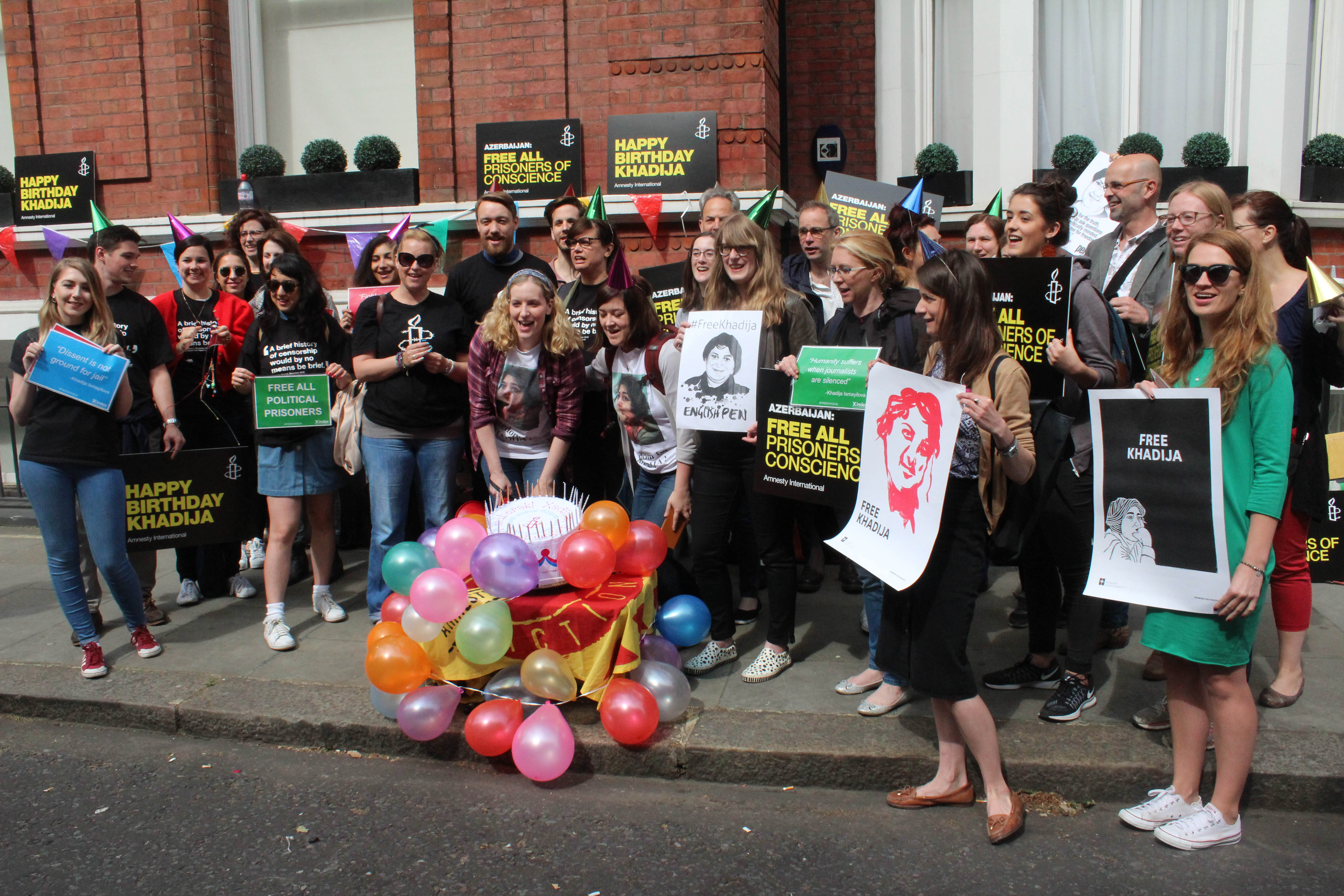
Protest for Khadija Ismayilova, Azerbaijan embassy, London. Credit: Cat Lucas, English Pen
Azerbaijani investigative journalist Khadija Ismayilova may have been released from prison on Wednesday, but two trumped-up charges against her — illegal entrepreneurship and tax evasion –remain. Her seven-and-a-half-year jail sentence has only been reduced to a three-and-a-half-year suspended term and she isn’t free to leave the country.
Today is Ismayilova’s 40th birthday and to mark the occasion, protesters gathered at 40 different demonstrations from around the world, not just to celebrate, but to call for all charges against her to be quashed. Index joined other members of the Sports for Rights coalition at the Azerbaijani embassy in London (see above).
Happy birthday Khadija! pic.twitter.com/FGPlA4Y3xt
— Index on Censorship (@IndexCensorship) May 27, 2016
“Let’s take a moment to celebrate the work that’s been done by this remarkable woman,” Rebecca Vincent, the co-ordinator of the Sport for Rights campaign, told demonstrators.
Currently, around 70 political prisoners — including journalists, bloggers, activists and religious followers — sit in Azerbaijani jails, and Vincent called on protesters to sustain their focus on all of them. “That’s what Khadija has asked for for her birthday,” she said.
Seymur Hezi is an Azerbaijani journalist serving a five-year prison sentence on charges of “aggravated hooliganism”. Hezi, who contributed to the Index on Censorship Freedom of Expression Award-winning newspaper Azadliq, was sentenced on 29 January 2015. He was arrested on 29 August 2014 following an altercation in which the journalist was defending himself from a physical assault and harassment, according to his lawyers. “His case doesn’t get enough international attention, possibly because he is not an English speaker and not well networked,” Vincent said.
Other political prisoners include Ilgar Mammadov, the opposition politician who leads Azerbaijan Republican Alternative Movement, who has been in jail for over three years, and Ilkin Rustemzade, the activistt originally jailed following his Harlem Shake video filmed in Baku.
On the same day Ismayilova was released, two more political prisoners, a youth activist and a journalist, were arrested.
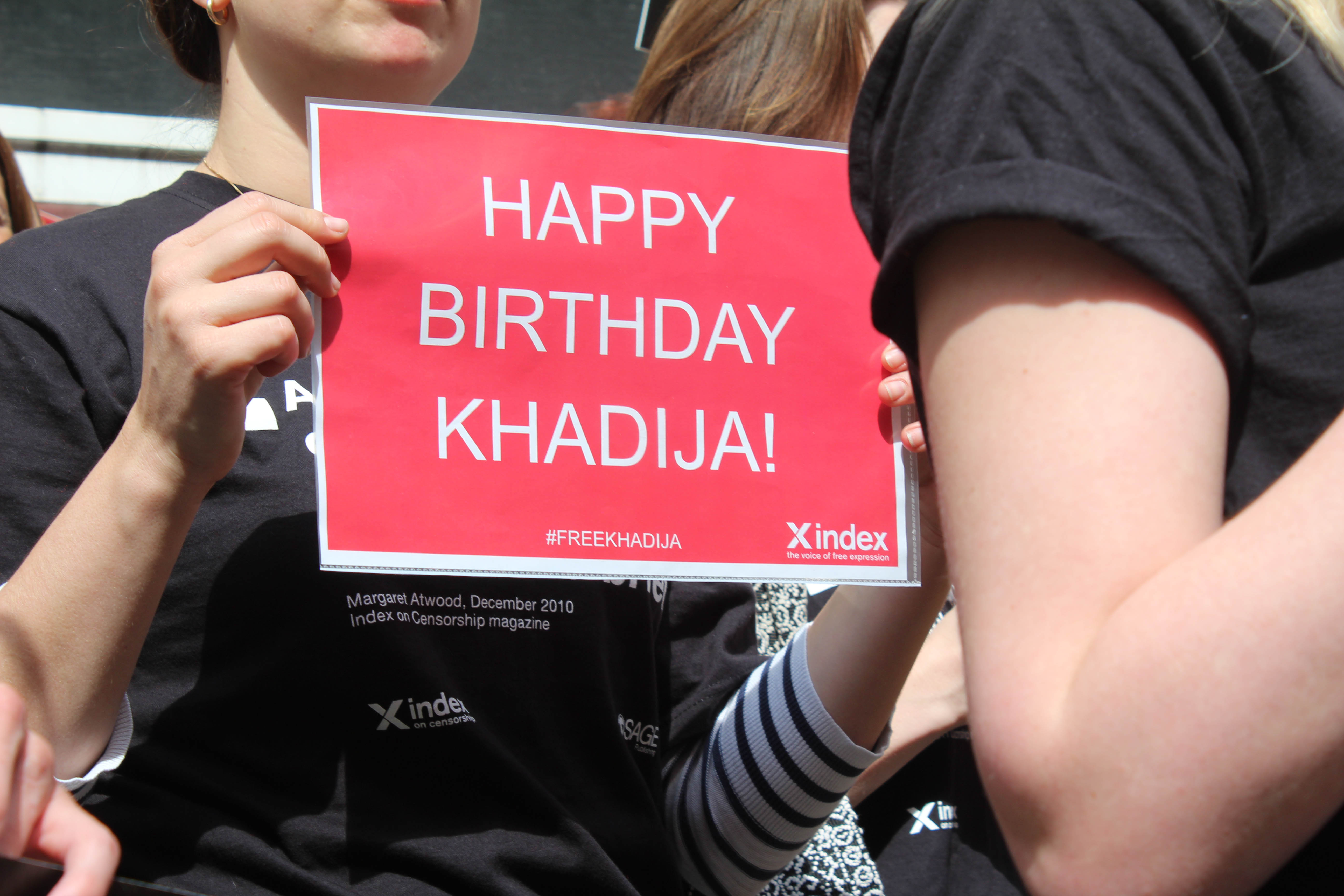
Protest for Khadija Ismayilova, Azerbaijan embassy, London. Credit: Cat Lucas, English Pen
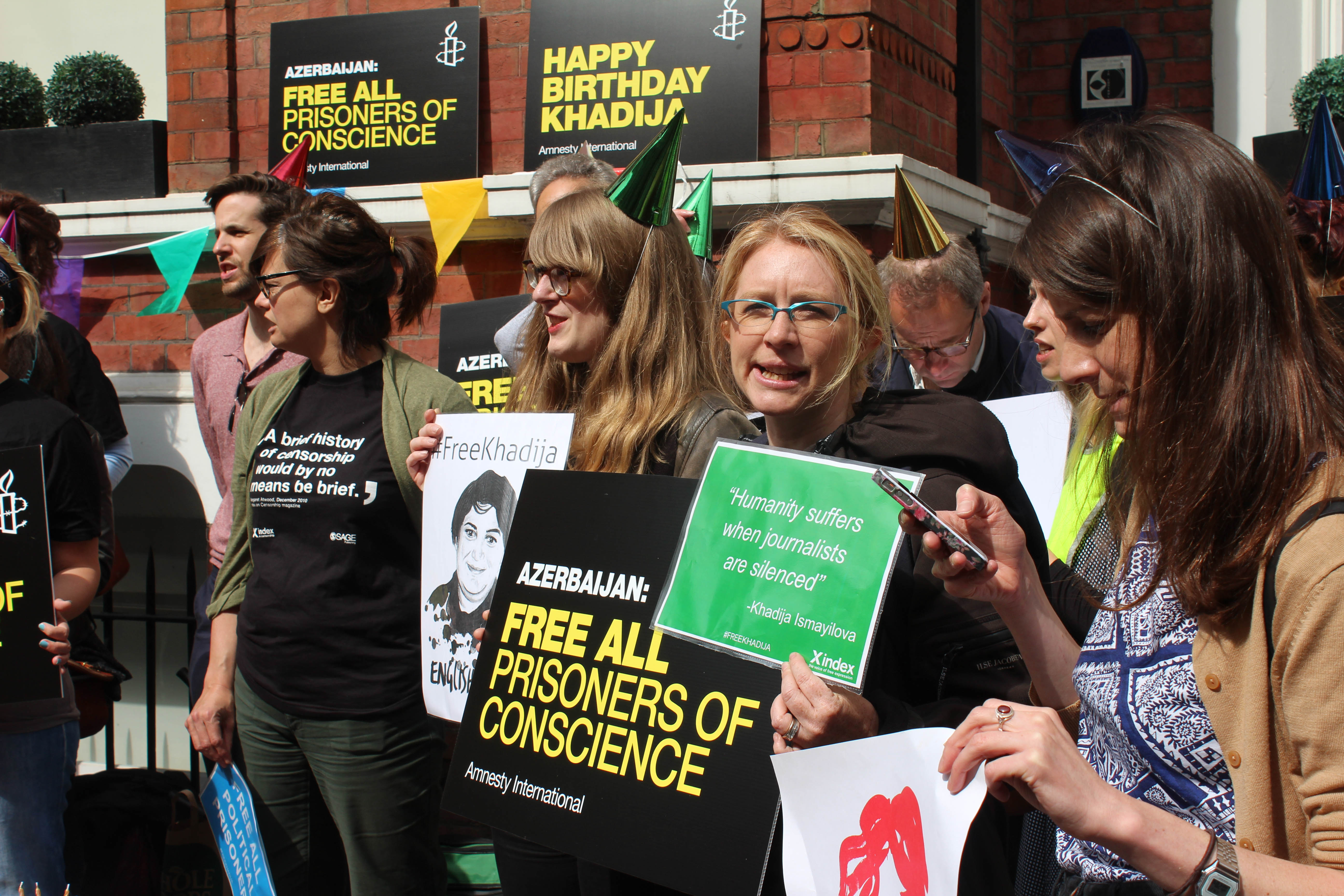
Protest for Khadija Ismayilova, Azerbaijan embassy, London. Credit: Cat Lucas, English Pen
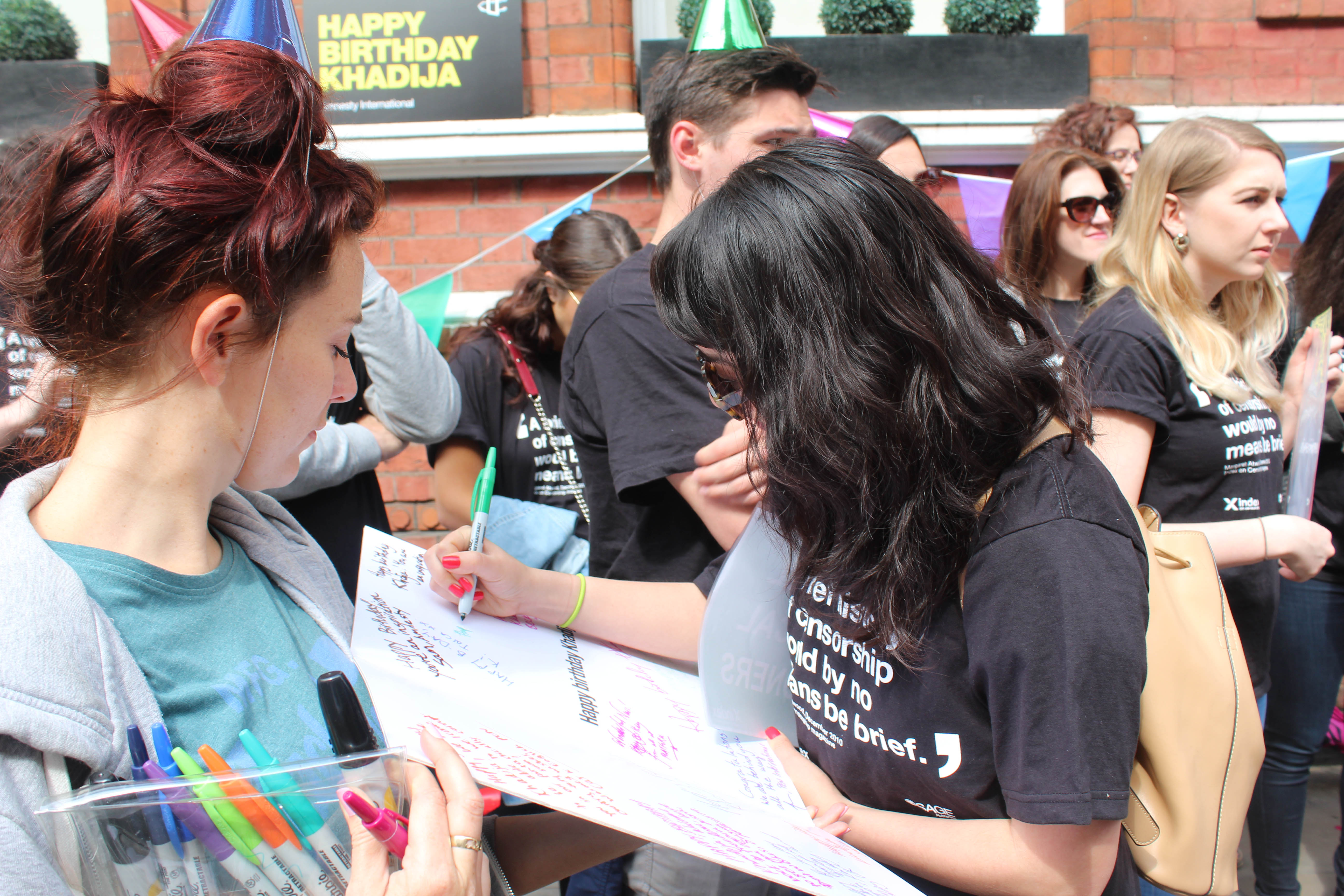
Protest for Khadija Ismayilova, Azerbaijan embassy, London. Credit: Cat Lucas, English Pen
Writing birthday wishes to @khadija_ismayil @melodypatry picks up her pen pic.twitter.com/nNBOsP8h9E
— IndexCensorshipMag (@Index_Magazine) May 27, 2016
Many more protests took place today. Here are some of them:
The #RSF team is celebrating #Khadija‘s birthday in front of the #Azerbaidjan Embassy. Happy bday! https://t.co/h7YEhlEvaV
— RSF (@RSF_inter) May 27, 2016
Thank you @RepMcGovern for joining us to celebrate @Khadija_Ismayil birthday and release! #FreeKhadija pic.twitter.com/sWMaM2z2zw
— Freedom Now (@freedomnoworg) May 26, 2016
Today we celebrate @Khadija_Ismayil but also remember dire #humanrights situation in #Azerbaijan,call #EU for action pic.twitter.com/PYQPLAY1gE
— Alexander Sjödin (@AJSjodin) May 27, 2016
Norwegian journalist Oystein Windstad demands freedom for Seymur Hazi @FrittOrd@SportForRightspic.twitter.com/d4jU6zbvQH
— NHC (@nhc_no) May 27, 2016
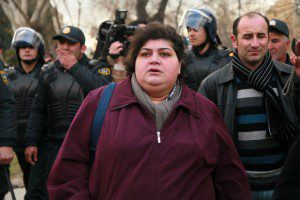 Azerbaijan’s Supreme Court has ordered the release of investigative journalist Khadija Ismayilova. But who is Ismayilova and why was she in prison?
Azerbaijan’s Supreme Court has ordered the release of investigative journalist Khadija Ismayilova. But who is Ismayilova and why was she in prison?
One of Azerbaijan’s most celebrated journalists, Ismayilova investigated, among other things, Azerbaijan’s human rights abuses and the corruption involving the family of president Ilham Aliyev. The recent Panama Papers have followed up on her work, exposing links between the president’s family and a network of offshore tax havens and hidden wealth.
Ismayilova was arbitrarily imprisoned in December 2014 and was sentenced in September 2015 to seven-and-a-half years in prison. Although she is officially charged with large-scale misappropriation and embezzlement, illegal entrepreneurship, tax evasion and abuse of official duties, it is widely believed that the real reason for Ismayilova’s imprisonment is her investigative journalism.
Before her arrest, Ismayilova had been subjected to a relentless campaign of intimidation and persecution, possibly orchestrated by the Azerbaijani authorities to discredit her investigative reporting on corruption amongst the highest levels of society.
“Khadija Ismayilova has suffered a serious invasion of her personal privacy through the installation of hidden cameras and wires in her flat and publication of secretly filmed videos among other incidents. Azerbaijan has a positive obligation to carry out an effective investigation into these violations,” said Camila Graham-Wood, legal officer at Privacy International.
Human rights lawyer Amal Clooney has been representing Ismayilova during her case at the European Court of Human Rights.
Her work was recognised by the United Nations which awarded her the prestigious Unesco/Guillermo Cano World Press Freedom Prize. When Ismayilova was in prison, her mother, Elmira Ismayilova, accepted the award on her daughter’s behalf. She read a statement Ismayilova wrote from prison: “As you gather here tonight, I ask you not to laud my work or my courage, but to dedicate yourself to the work each one of you can do on behalf of press freedom and justice.”
She read a statement Ismayilova wrote from prison: “As you gather here tonight, I ask you not to laud my work or my courage, but to dedicate yourself to the work each one of you can do on behalf of press freedom and justice.” Ljiljana Zurovac, president of the Unesco/Guillermo Cano World Press Freedom Prize 2016 jury, said: “Khadija Ismayilova highly deserves the prize and I am happy to see that her courage and professionalism are recognised.”
Azerbaijan is one of the lowest ranked countries for press freedom, being placed 163 out of 180 countries on the 2016 Reporters Without Border’s World Press Freedom Index.
Protests due to take place this Friday to mark Ismayilova spending her 40th birthday in prison will still go ahead to celebrate her release, call for her full acquittal and for the release of the country’s political prisoners, including Ilgar Mammadov, Seymur Hezi and Ilkin Rustemzade.
Mapping Media Freedom launched to the public on 24 May 2014 to monitor media censorship and press freedom violations throughout Europe. Two years on, the platform has verified over 1,800 media violations.
“The data the platform has collected over the last two years confirms that the state of press freedom across Europe is deplorable,” said Hannah Machlin, project officer for Mapping Media Freedom. “Media violations are occurring regularly in countries with strong democratic institutions and protective laws for journalists. Legislation limiting the press, violence across the continent and authoritarian governments are also fuelling this rapid and worrying decline. We hope that institutions and leaders take note of this information and take action swiftly.”
To mark the anniversary, we asked our correspondents to pick a key violation that stood out to them as an example of the wider picture in their region.
Russia / 113 verified reports
Several journalists and human rights activists attacked in Ingushetia
“The brutal attack on a minibus carrying six journalists and several human rights activists near the border between Ingushetia and Chechnya on the 9 March 2016 demonstrates the dangers faced by media professionals working in Russia’s North Caucasus. No suspects have been established so far. This case stands out due to its extreme violence but also supports a common trend: the reluctance of the local authorities to ensure that the journalists’ rights are respected.” – Ekaterina Buchneva
Italy / 190 verified reports
97 journalists accused of breaking the law in mafia investigation
“This was a very relevant investigation, with no precedent, that took place in October, a few weeks away from the start of the trial known as Mafia Capitale, which concerns the scandal that involved the government of the city of Rome. It is a collective intimidation because it involved 97 journalists, who were denounced for violating the secret on the ongoing investigations. It is a really serious form of intimidation because it was activated within the field of law and thus is not punishable.” – Rossella Ricchiuti
Turkey / 57 verified reports
Zaman newspaper seized by authorities
“These attacks and actions taken by the government against independent media in Turkey attest to the shrinking space of independent media overall. In addition, it illustrates the shifting power dynamic within the ruling government in Turkey where once upon a time friends, are turned into enemies by the regime. As the paper wrote itself, Turkey is headed through its ‘darkest and gloomiest days in terms of freedom of the press.'” – MMF’s Turkey correspondent
Azerbaijan/ 5 verified reports
Writer banned from leaving country
“Aylisl’s 12-hour interrogation at the airport and later charges of hooliganism were just as absurd as the claim that a 79-year-old man, suffering from a heart condition and other health issues would attack an airport employee to such an extent that it would cause hemorrhage. I chose this example to illustrate the absurdity of charges brought against individuals in Azerbaijan but also the extent to which the regime is ready to go in order to muzzle those voices who different.” – MMF’s Azerbaijan correspondent
Macedonia / 59 verified reports
Deputy Prime Minister attacks journalist
“This incident best demonstrates the division in society as a whole and among journalists as a professional guild. This is a clear example of how politicians and elites look upon and treat the journalist that are critical towards their policies and question their authority.” – Ilcho Cvetanoski
Bosnia / 56 verified reports
Police raid Klix.ba offices
“This was the most serious incident over the last two years in Bosnia regarding the state’s misuse of institutions to gag free media and suppress investigative journalism. In this specific incident, the state used its mechanisms to breach media freedoms and send a chilling message to all other media.” – Ilcho Cvetanoski
Croatia / 64 verified reports
Journalist threatened by disbanded far-right military group
“After the centre-right government in Croatia came to power in late 2015, media freedom in the country rapidly deteriorated. Since then around 70 media workers in the public broadcaster were replaced or removed from their posts. This particular case of the prominent editor-in-chief of the weekly newspaper Novosti receiving a threatening letter from anonymous disbanded military organisation demonstrates the polarisation in the society and its affect on media freedom.” – Ilcho Cvetanoski
Greece / 34 verified reports
Golden Dawn members assault journalists covering demonstration
“This was the second attack against journalists by Golden Dawn members within one month. With more than 50,000 asylum seekers and migrants trapped in Greece, the tension between members of the far-right group and anti-fascist organisations is rising.” – Christina Vasilaki
Poland / 35 verified reports
Over 100 journalists lose jobs at public broadcasters
“This report highlights the extent of the ongoing political cleansing of the public media since the new media law was passed in early January.” – Martha Otwinowski
Germany / 74 verified reports
Journalist stops blogging after threats from right-wing extremists
“The MMF platform lists numerous incidents where German journalists have been threatened or physically assaulted by right-wing extremists over the last two years. This incident stands out as a case of severe intimidation that resulted in silencing the journalist altogether.” – Martha Otwinowski
Belgium / 19 verified reports
Press asked to respect lockdown during anti-terrorism raids
“On 22 November 2015, the Belgian authorities asked the press to refrain from reporting while a big anti-terrorist raid was taking place in Brussels. While understandable, this media lock-down raised questions for press freedom and underlined the difficulties of reporting on terror attacks and anti-terror operations.” – Valeria Costa-Kostritsky
Luxembourg / 2 verified reports
Investigative journalist on trial for revealing Luxleaks scandal
“This Luxleaks-related case is the only violation we have become aware in Luxembourg over the period (which is not to say that no other cases occurred). Along with two whistleblowers, a journalist was prosecuted by PricewaterhouseCoopers and accused of manipulating a whistleblower into leaking documents. This is a good example of the threat the notion of trade secrets can represent to journalism.” – Valeria Costa-Kostritsky
Ukraine / 127 verified reports
Website leaks personal information of more than 4,000 journalists
“This incident shows how fragile the media freedom and personal data of journalists are in armed conflict. Even after a great international scandal, the site continues to break the legislation and publishes new lists. It has been operating for two years already and those involved in its activities go unpunished. It seems that the post-Maidan Ukraine has simply ‘no political will’ for this.” – Tetiana Pechonchyk
Crimea / 18 verified reports
Journalists’ homes searched, criminal case filed
“This report shows the everyday life of independent journalists working on the peninsula. Only a few critical voices are still remaining in Crimea while the majority of independent journalists were forced to leave the profession or to leave Crimea and continue their work on the mainland Ukraine.” – Tetiana Pechonchyk
Spain / 49 verified reports
Journalist fined for publishing photos of arrest
“The latest issue for the Spanish media is the Public Security Law, introduced in June 2015, which among other things limits space for reporters. The law prohibits the publication of photo and video material where police officers may be identified, unless official state permission is obtained. This was the first case of a journalist being fined by the new law.” – Miho Dobrasin
Belarus / 47 verified reports
Journalist beaten by police, detained and fined for filming police attacks
“The story has ended in impunity: a criminal case was not even filed against the police officers who had beaten the journalist.” – Volha Siakhovich
Latvia / 12 verified reports
Latvia and Lithuania ban Russian-language TV channels
“This was the beginning of a disturbing tendency to react with rather futile gestures against Russian television channels. The bans are not so much against the media, as telling the audience that the authorities, not the public, will decide what Latvian viewers may or may not see or hear.” – Juris Kaža
Serbia / 110 verified reports
Investigative journalists victim of smear campaign
“You have to be very brave to launch a new investigative journalism portal in Serbia and expose corruption and organised crime involving government officials. That is why the launch of KRIK in early 2015 has been so important for media freedom, but at the same time so dangerous for its journalists. Smear campaigns like this by pro-government tabloid Informer are a relatively new but common method in the Balkans to scare journalists off.” – Mitra Nazar
Mapping Media Freedom
|
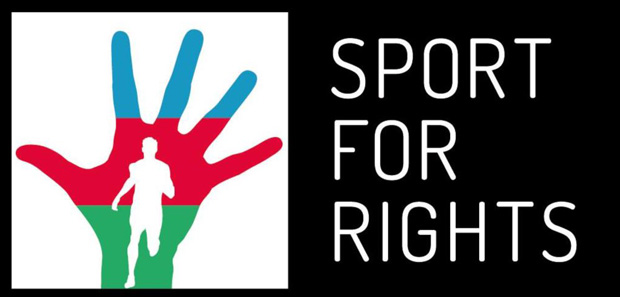
London, 17 May 2016: The Formula One Group leadership should urge the Azerbaijani government to release unjustly imprisoned activists and journalists ahead of the European Grand Prix in Azerbaijan, said the Sport for Rights coalition today.
Azerbaijan will host its first Formula One European Grand Prix race on 17-19 June 2016 in the capital, Baku. The Azerbaijani government has sought to host a number of high-profile sports and other events in recent years, including the inaugural European Games in 2015, while cracking down on human rights activists and critical journalists, as event organisers stayed silent.
“Formula One leadership has a crucial opportunity to press the Azerbaijani government to make concrete steps to improve its human rights record ahead of the Baku Grand Prix”, said Jane Buchanan, associate director for Europe and Central Asia, at Human Rights Watch. “If it remains silent, Formula One risks condoning the government’s efforts to benefit from the prestige of international events, while silencing domestic critics, without consequences”.
Sport for Rights is a coalition of international human rights groups working to draw attention to the dramatic human rights situation in Azerbaijan. The coalition campaigns for the protection of human rights in Azerbaijan and calls on international sporting organisations to press for better human rights safeguards in countries hosting major sporting events.
In recent years, the government of Azerbaijan has undertaken a systematic crackdown on journalists, media outlets, and independent activists. The authorities have arrested or imprisoned dozens on politically motivated charges, including Azerbaijan’s best-known investigative journalist, Khadija Ismayilova, and opposition politician Ilgar Mammadov. The government has also forced numerous independent groups critical of the government to cease operations.
The Formula One Group has explicitly acknowledged its human rights responsibilities, in a policy that states it is “committed to respecting internationally recognised human rights in its operations globally”.
In a letter to Bernard Ecclestone, Chief Executive of Formula One Group, the groups urge Formula One to speak out publicly against the Azerbaijan government’s crackdown on critics and call for the release of those wrongly imprisoned.
“It’s commendable that Formula One group recognises its human rights responsibilities, but the policy has little meaning unless the leadership insists on respect for fundamental human rights protections in the countries that host the Grand Prix” said Rebecca Vincent, coordinator of the Sport for Rights campaign. “If the Azerbaijani government wants the reputational boost of being a global sporting host, it must also recognise its obligations to allow independent media and activists to speak freely, even if it doesn’t always like the message”.
The Azerbaijani government has taken some positive steps in 2016, including releasing at least 16 activists and journalists imprisoned on politically motivated charges. However, many outstanding, extremely serious concerns remain, and the government continues to harass and detain critics, the Sport for Rights coalition said.
In the letter to Formula One Chief Bernie Ecclestone, the coalition called the Formula One Group to take a number of essential steps, including calling on the Azerbaijani authorities to:
The coalition noted that during the 2015 European Games in Baku, the government prevented numerous leading international journalists from covering the Games, without any penalty or consequences from the Games’ organisers.
“Formula One Group has a chance to support the critical voices remaining in Azerbaijan and ensure the Grand Prix doesn’t repeat the human rights failures of the European Games”, said Emin Huseynov, director of the Institute for Reporters’ Freedom and Safety. “By using its unique position, the Formula One group can ensure that the legacy of the Grand Prix in Azerbaijan is not greater repression”.
For more Human Rights Watch reporting on Azerbaijan, please visit:
https://admin.hrw.org/europe/central-asia/azerbaijan
For more information on Sport for Rights, please visit:
https://www.facebook.com/sport4rights/
For more information, please contact:
For Human Rights Watch, in New York, Jane Buchanan (English, Russian): +1-646-644-4847, or [email protected]. Twitter: @JaneMBuchanan
For Human Rights Watch, in Tbilisi, Giorgi Gogia (English, Georgian, Russian): +995-577-42-12-35 (mobile); or [email protected]. Twitter: @Giorgi_Gogia
For Sport for Rights, in London, Rebecca Vincent (English, Azerbaijani): +44 (0)7583 137751 (mobile); or [email protected]. Twitter: @rebecca_vincent
For the Institute for Reporters’ Freedom and Safety, in Geneva, Emin Huseynov (English, Azerbaijani, Russian): +41 (0) 788788428 (mobile); or [email protected]. Twitter: @EminAzerbaijan
Bernard Ecclestone
Chief Executive
Formula One Group
6 Princes Gate
Knightsbridge
London SW7 1QJ
17 May 2016
Dear Mr Ecclestone,
We, the undersigned members of the Sport for Rights coalition, are writing to you in advance of the Baku European Grand Prix in June to provide details on Azerbaijan’s deeply troubling human rights record and steps that we believe Formula One Group can take to ensure its compliance with its human rights responsibilities.
Sport for Rights is a coalition of international non-governmental organisations working together to promote human rights in Azerbaijan. As Azerbaijan hosts and bids to host international sporting events, with the media spotlight, prestige, and reputational boost that those events can bring to a host country, we are consistently calling on international sporting organisations and others to take meaningful action consistent with their human rights responsibilities as well as use the opportunity of sporting events to press for better human rights protections.
In the run-up to the European Grand Prix in Baku, the Azerbaijani authorities have continued with their human rights crackdown to silence critical voices. We urge you to use the European Grand Prix as an opportunity to speak out against the crackdown and call for the release of jailed journalists and activists.
Formula One Group’s Responsibilities
Formula One Group states that it “is committed to respecting internationally recognised human rights in its operations globally”. The policy also states that Formula One Group will take steps to “understand and monitor through our due diligence processes the potential human rights impacts of our activities”, “identify and assess, by conducting due diligence where appropriate, any actual or potential adverse human rights impacts with which we may be involved”, “consider practical responses to any issues raised as a result of our due diligence”, and “engage in meaningful consultation with relevant stakeholders in relation to any issues raised as a result of our due diligence”. Sport for Rights welcomes this explicit acknowledgement and statement of Formula One Group’s human rights responsibilities.
As you will be aware the United Nations Guiding Principles on Business and Human Rights (Ruggie Principles) and the Organisation for Economic Cooperation and Development (OECD) Guidelines for Multinational Enterprises, issued in 2011 both provide that entities such as Formula One Group bear responsibilities to carry out effective human rights due diligence, to avoid contributing to adverse human rights impacts and to address any that arise.
Grave Human Rights Situation in Azerbaijan
As you may also be aware, in recent years, the government of Azerbaijan has undertaken a dramatic crackdown on journalists, media outlets and civil society leaders and independent organisations. Specifically the authorities have:
Recently, the authorities have taken some positive, but limited steps. In March 2016, the authorities pardoned or conditionally released at least 16 human rights defenders, activists, and journalists imprisoned on politically motivated charges. In April 2016, the government also finally allowed leading activist, Leyla Yunus, and her husband, Arif Yunus, to travel abroad for medical treatment. The Yunuses had earlier been released on suspended sentences from prison, where their fragile health conditions had deteriorated precipitously since their arrests on politically motivated charges in 2014, charges levied in retaliation for their activism.
However, many outstanding, extremely serious concerns remain, and the crackdown on independent voices has not ended.
The criminal records of the recently released activists have not been expunged and some continue to face restrictions, including travel bans and frozen bank accounts. Other prominent activists and journalists arrested on politically motivated charges remain behind bars. They include:
On 30 March 2016, authorities detained 79-year-old writer Akram Aylisli at the Baku airport for 12 hours, questioned him, and prevented him from travelling. Authorities later charged him with violently resisting authorities, and he faces up to three years’ imprisonment if convicted.
On 20 April 2016, the Azerbaijani authorities opened a criminal investigation against Meydan TV, a leading independent online broadcast news outlet, only able to operate out of Germany, with correspondents and other staff based in Azerbaijan. The Azerbaijani prosecutor’s office named 15 journalists in the investigation, at least seven of whom remain in the country under travel bans, and face the threat of politically motivated trials and imprisonment.
In addition, the Azerbaijani government has not committed to amending the restrictive legislation regulating NGOs and NGO funding. In December 2015, the Ministry of Justice adopted new regulations granting the ministry nearly uninhibited powers to conduct inspections at non-governmental organisations.
Role of Formula One Group
In light of this deeply troubling human rights situation, we encourage you to use your prominent role within Formula One racing to guarantee a positive legacy from the European Grand Prix in Baku and ensure that the race is not stained by severe violations of press freedom and human rights.
Specifically, in advance of the opening of the Grand Prix in Baku on 17 June 2016, we urge you to:
In addition, we would welcome more information on and strongly encourage Formula One Group to publicly disclose the responsible parties, timeline, terms, specific actions, indicators, and outcomes of its due diligence procedure undertaken in relation to the European Grand Prix in Baku, including information on consultation with stakeholders, in line with the UN Guiding Principles on Business and Human Rights requirements and their call for transparency as an essential element of meaningful due diligence.
Finally, representatives from the Sports for Rights coalition would welcome the opportunity to meet you in the coming weeks to discuss these issues in more detail.
Sincerely,
Rebecca Vincent, Coordinator, Sport for Rights campaign
Katie Morris, Head of Europe and Central Asia Programme, ARTICLE 19
Alice Klein, President, Canadian Journalists for Free Expression
Robert Hårdh, Executive Director, Civil Rights Defenders
Nina Ognianova, Europe and Central Asia Program Coordinator, Committee to Protect
Journalists
Maran Turner, Executive Director, Freedom Now
Mary Lawlor, Executive Director, Front Line Defenders
Danuta Przywara, President of the Board, Helsinki Foundation for Human Rights
Hugh Williamson, Director, Europe and Central Asia Division, Human Rights Watch
Melody Patry, Senior Advocacy Officer, Index on Censorship
Emin Huseynov, Director, Institute for Reporters’ Freedom and Safety
Jesper Højberg, Executive Director, International Media Support
Brigitte Dufour, Director, International Partnership for Human Rights
Petra Havlikova, Project Coordinator of the Women’s Rights Are Human Rights
Programme, NESEHNUTI
Pepijn Gerrits, Executive Director, Netherlands Helsinki Committee
Berit Lindeman, Senior Advisor, Norwegian Helsinki Committee
Karin Karlekar, Director, Free Expression Programs, PEN America
Ann Harrison, Programme Director, Writers in Prison Committee, PEN International
Emma Hughes, Strategy Director, Platform
Ivana Skalova, Head of the East European Program, People in Need
Aleksandra Antonowicz-Cyglicka, Head of Programme, Action for the Global
South, Polish Green Network
Łukasz Biernacki, Managing Director, You Aid Foundation